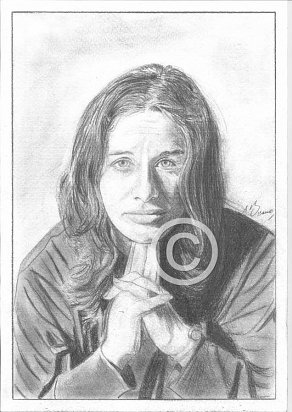Carole King
Pencil Portrait by Antonio Bosano.

Shopping Basket
The quality of the prints are at a much higher level compared to the image shown on the left.
Order
A3 Pencil Print-Price £45.00-Purchase
A4 Pencil Print-Price £30.00-Purchase
*Limited edition run of 250 prints only*
All Pencil Prints are printed on the finest Bockingford Somerset Velvet 255 gsm paper.
P&P is not included in the above prices.

Recommended listening
Tapestry (1971)
Carole King’s ‘Tapestry’ album is one of the top selling albums of all time – over 25m units sold – and would usher in the age of the singer-songwriter.
Whilst unable to match the vocal gymnastics of many of the female artists who had popularised her work, king would opt for an ordinary voice and an unembellished intimacy, the sometimes glaring imperfections became the order of the day, as scores of songwriters invited listeners into their worlds. The emphasis was on honesty and imperfection, and the only kit needed was an acoustic guitar or piano and a notepad to transform emotional turmoil into lyrics. Every poet–with–a-guitar who’s ever bared their soul at an open-mic night, has “Tapestry” to thank for the inspiration.
Already a songwriting pro for more than a decade, the woman responsible for the Shirelles’ “Will You Love Me Tomorrow?” and Aretha Franklin’s “(You Make Me Feel Like) A Natural Woman,” was nevertheless astute enough to realise that, whilst matching the majestic sweep of those definitive renditions would be nigh impossible, she could nonetheless convey the very real sentiments in her songs with an ordinary yet expressive voice that millions would relate to. As we have already seen, many millions did precisely just that, suitably buoyed by the inclusion of two new compositions “It’s Too Late,” and “So Far Away.”
When I met my wife, she had the CD without the appropriate player on which to listen to it. Put succinctly as possible, for women of a certain generation, it was unthinkable not to own it.


Comments
Sheila Weller wrote an excellent book entitled “Girls Like Us: Carole King, Joni Mitchell, Carly Simon—and the Journey of a Generation,” which was published by Atria Books, an imprint of Simon & Schuster, in 2008. Whilst dwelling too long on her subjects’ romantic entanglements, she nonetheless achieves considerable success in defining their success within the context of the era in which they thrived.
In her book, she writes: Carole King’s semi-autobiographical 1960 composition “Will You Love Me Tomorrow,” co-written with her first husband, Gerry Goffin, was the earliest pop song in which a single woman expressed sexual self-awareness, and the first-ever No. 1 hit by a girl group, the Shirelles. It became the song of the year as John Kennedy was sworn in as president. It jump-started King’s string of urban elegies—chiefly “Up on the Roof” — which were among a group of mainstream hits providing average white kids with an atmospheric echo of the civil-rights movement.
Ten years later, in 1971 — as a divorced mother of two, getting younger as she got older (as one could do only back then) — she produced her masterpiece album, ‘Tapestry.’ It would stand as one of the biggest-selling, Grammy-sweeping albums of the decade and would form a soundtrack for an era when, in the shell-shocked wake of rock-world excess and political assassinations, people rebounded to harmony, communality, and earnestness. With her Earth-Mother-next-door looks, complete rejection of artifice, comfort with herself, and discomfort with the limelight, she redefined what a “beautiful” woman was. Affection for her music and for her has resonated over four decades, and her second career, as an environmental advocate, has affected U.S. wilderness policy.